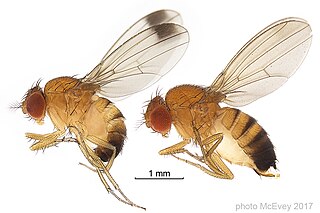
Drosophila is a genus of flies, belonging to the family Drosophilidae, whose members are often called "small fruit flies" or pomace flies, vinegar flies, or wine flies, a reference to the characteristic of many species to linger around overripe or rotting fruit. They should not be confused with the Tephritidae, a related family, which are also called fruit flies ; tephritids feed primarily on unripe or ripe fruit, with many species being regarded as destructive agricultural pests, especially the Mediterranean fruit fly.

The Drosophilidae are a diverse, cosmopolitan family of flies, which includes fruit flies. Another unrelated family of flies, Tephritidae, also includes species known as "small fruit flies". The best known species of the Drosophilidae is Drosophila melanogaster, within the genus Drosophila, and this species is used extensively for studies concerning genetics, development, physiology, ecology and behaviour. This fruit fly is mostly composed of post-mitotic cells, has a very short lifespan, and shows gradual aging. As in other species, temperature influences the life history of the animal. Several genes have been identified that can be manipulated to extend the lifespan of these insects. Additionally, Drosophila subobscura, also within the genus Drosophila, has been reputed as a model organism for evolutionary-biological studies.

The Drosophilinae are the largest subfamily in the Drosophilidae. The other subfamily is the Steganinae.
Elwood Curtin Zimmerman was an American entomologist best known for his two multivolume series: Insects of Hawaii published by the University of Hawaiʻi Press and Australian Weevils published by Australia's CSIRO.

Drosophila suzukii, commonly called the spotted wing drosophila or SWD, is a fruit fly. D. suzukii, originally from southeast Asia, is becoming a major pest species in America and Europe, because it infests fruit early during the ripening stage, in contrast with other Drosophila species that infest only rotting fruit.

Chymomyza fuscimana is a species of fly in the family Drosophilidae. It is found in the Palearctic.
Drosophila colorata is a species of vinegar fly in the family Drosophilidae. It is found in the United States.
Drosophila putrida is a species of fruit fly in the family Drosophilidae. It is found throughout the temperate central-eastern United States. Like other members of the Drosophila testacea species group, D. putrida breeds exclusively on mushrooms.

Drosophila repleta is a species of vinegar fly in the family Drosophilidae.

Chymomyza is a genus of vinegar flies. There are about 10 described species in Chymomyza.

Zaprionus indianus, the African fig fly, is a species of vinegar fly in the family Drosophilidae.
Drosophila tripunctata is a species of vinegar fly in the Immigrans-tripunctata radiation of the subgenus Drosophila.
Pseudiastata is a genus of vinegar flies. There are about 11 described species in Pseudiastata.
Chymomyza procnemoides is a species of fruit fly in the family Drosophilidae. It is found in Europe.
Promachus aldrichii is a species of robber flies.

Scaptomyza is a genus of vinegar flies, insects in the family Drosophilidae. There are at least 270 described species in Scaptomyza.

Chymomyza amoena is a species of fruit fly in the family Drosophilidae. It is found in Europe.
Cladochaeta is a genus of spittlebug flies, insects in the family Drosophilidae. There are at least 120 described species in Cladochaeta.
Drosophila quinaria is a species of fruit fly in the Drosophila quinaria species group. Most Quinaria group species feed largely on mushrooms. However D. quinaria instead eats decaying vegetative matter, a trait it evolved independently.
Drosophila albomicans is a species of vinegar fly in the family Drosophilidae. Drosophila albomicans is a member of the Immigrans-tripunctata radiation of the subgenus Drosophila. The D. albomicans genome was first sequenced in 2012 to study the evolution of novel sex chromosomes, a characteristic this species is best known for. One commonly accepted definition of the biological species concept is that individuals or populations are members of different species if they are incapable of successful interbreeding. While D. albomicans and Drosophila nasuta are commonly referred to as distinct species, there appears to be little to no sexual isolation between these two Drosophila species. Instead, behavioural differences appear to reproductively isolate these two species.








